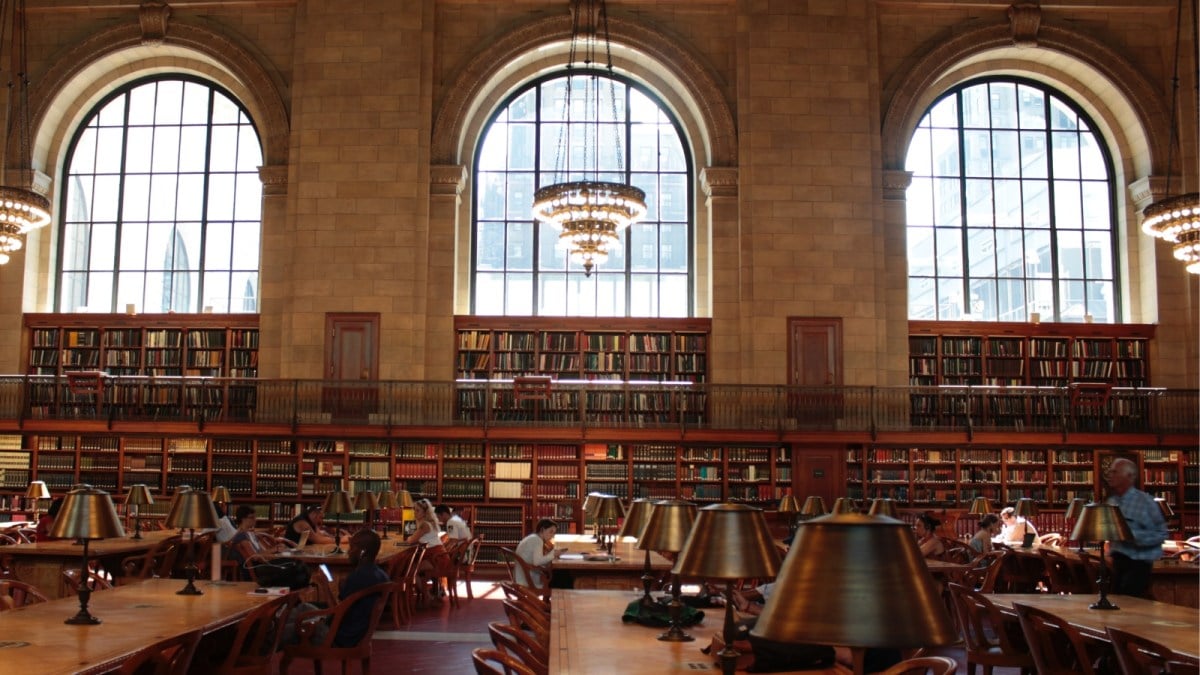As book bans continue to make headlines across the country, libraries are at the forefront of the fight to keep information free and accessible to their patrons—which include people of all ages, ethnicities, and class statuses. This fight is made more difficult by budget cuts and attempts by the GOP to completely defund these necessary institutions, which provide a variety of services that are often inaccessible or unavailable elsewhere. To put it plainly, libraries deserve better than being relegated to the margins of budget proposals, and they certainly deserve better than to survive by the skin of their proverbial teeth.
In the last month alone, the Missouri GOP has attempted to defund the state’s public libraries, only to be stopped by the senate committee; New York City mayor Eric Adams proposed eliminating weekend hours at the five boroughs’ public libraries, which the NYPL barely stopped; and proposed budget cuts in Toledo, OH threatened its libraries.
It isn’t all bad—Salt Lake City Public Library workers have announced the formation of a union and contentious materials like Maia Kobabe’s autobiographical graphic novel have been returned to shelves in several states after months of debate over whether they should even be in print (they should), let alone freely available at local libraries (they definitely should). In recent years, library workers and advocates have been on a rollercoaster ride driven primarily by bigotry and a determination to censor any material that doesn’t uphold this country’s history of white supremacy, and it’s time to restore stability to these essential institutions.
Books are essential both for providing information and for creating worlds into which people can escape. Accessing them for free through public libraries is equally essential.
However, these are not the only tools available through library systems. Public libraries also provide free computer and Internet access, which is essential for students, people facing unemployment, and anyone who does not have these tools at their disposal elsewhere. Public libraries provide neutral spaces to work, study, read, and complete projects. Public libraries frequently offer story hours, performances, book clubs, meetings, and other group activities that are (once again) free and available to everyone. They also provide classes, trainings, and more tools to prepare students, entrepreneurs, and others to enter or re-enter the workforce, develop STEM skills, and more. When one looks at the available services provided by public libraries, it becomes apparent how essential they are—yet proposed budget cuts and defunding measures continue to make headlines.
Federal library funds are mainly distributed to each state through the Institute of Museum and Library Services and the Library Services and Technology Act (LSTA), which as of December 2022 contained approximately $189.3 million available for more than 120 thousand libraries nationwide. This works out to approximately $1,578 in federal funding per library, which breaks down to just $131 per month to support provided services. States who vote to cut funding to their local libraries or to defund them entirely leave these institutions to wither and die lest local populations make enough noise to push back against laws rooted in archaic definitions of what information should and shouldn’t be available.
Dismantling library systems also contributes to unemployment and introduces even more obstacles for those who use their services to even attempt to commit to the bootstrap rhetoric that the very members of the GOP who so despise libraries frequently tout when they demean and dehumanize those forced to live below the poverty line. Whatever the argument for killing public libraries, it will always make more sense to pour more money into them, rather than less.
Those who want libraries to disappear don’t actually care about developing a better, stronger country. They care about breaking it apart at its seams, perpetuating bigotry in the name of genocide, and keeping as much money in their pockets as they possibly can.
Public libraries, library workers, and the people who frequent libraries for any of their available services deserve better than to be canon fodder for bipartisan arguments about censorship and the economy. Defunding even a single library system creates a domino effect that ultimately makes life harder for everyone, including those lobbying hardest to defund and destroy.
(Featured image: Antoinette Plessis / Unsplash)









Published: May 18, 2023 05:06 pm